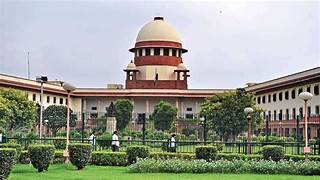Top court directs High Courts to halt proceedings on similar petitions in these states and Bihar; matter posted for detailed hearing on November 26 amid fears of mass voter disenfranchisement ahead of 2026 polls
Published on: November 11, 2025
By: BTNI
Location: New Delhi, India
In a significant development, the Supreme Court on Tuesday issued a notice to the Election Commission of India (ECI), seeking its response to multiple petitions questioning the constitutional validity of the ongoing Special Intensive Revision (SIR) of electoral rolls in Tamil Nadu, Puducherry, and West Bengal. A bench comprising Justices Surya Kant and Joymalya Bagchi also instructed High Courts across these states, along with Bihar, to keep all related petitions in abeyance until the apex court delivers its final verdict.
The petitions, filed by major opposition parties including the Dravida Munnetra Kazhagam (DMK), Communist Party of India (Marxist), Trinamool Congress MP Dola Sen, and the West Bengal Congress Committee, argue that the SIR process is arbitrary, rushed, and prone to excluding genuine voters. Senior advocate Kapil Sibal, representing the DMK, highlighted during the hearing that previous revisions took up to three years, whereas the current exercise is being compressed into mere months, raising concerns over feasibility and fairness.
The ECI has been given two weeks to file its counter-affidavit, with the matter scheduled for the next hearing on November 26. In a notable intervention, the bench requested jurisdictional High Courts to defer proceedings, stating, “Since this Court is seized of the matter pertaining to the legality of SIR of electoral rolls in various states including Bihar, West Bengal, Tamil Nadu, Pondicherry, etc., we request the High Courts to keep in abeyance the writ proceedings touching the validity of SIR.
“The SIR, launched as Phase II on November 4 across 12 states and Union Territories covering over 51 crore voters, requires house-to-house enumeration and fresh documentation, leading to fears of widespread deletions similar to Bihar, where over 68 lakh names were removed earlier this year. Petitioners contend that the process effectively shifts the burden of proof onto voters, potentially violating Articles 14, 19, 21, 325, and 326 of the Constitution.
Also read- https://www.btnewsindia.com/pm-suryaghar-free-electricity-scheme-empowers-consumers-in-chhattisgarh/ https://www.btnewsindia.com/दिल्ली-में-लाल-किले-के-पास/
In Tamil Nadu, the DMK has pointed out that a Special Summary Revision (SSR) was already completed between October 2024 and January 2025, making the SIR redundant and malicious. West Bengal petitioners echo similar sentiments, alleging it could disenfranchise marginalised communities ahead of the 2026 Assembly elections.
Conversely, the All India Anna Dravida Munnetra Kazhagam (AIADMK) has supported the SIR in Tamil Nadu, terming it essential for preventing voter fraud and maintaining electoral purity. The ECI defends the exercise as a necessary cleanup to ensure accurate rolls, denying any political motive.
As enumeration continues until December 4, with draft rolls due on December 9 and final publication on February 7, 2026, political tensions escalate. Opposition leaders like Tamil Nadu CM MK Stalin and West Bengal CM Mamata Banerjee have accused the ECI of “silent rigging,” while the BJP welcomes it for transparency.
This Supreme Court intervention could shape the future of electoral reforms, balancing the need for clean voter lists against the risk of excluding eligible citizens. With assembly polls looming in key states, all eyes are on November 26 for potential directives that might pause or modify the SIR process.




